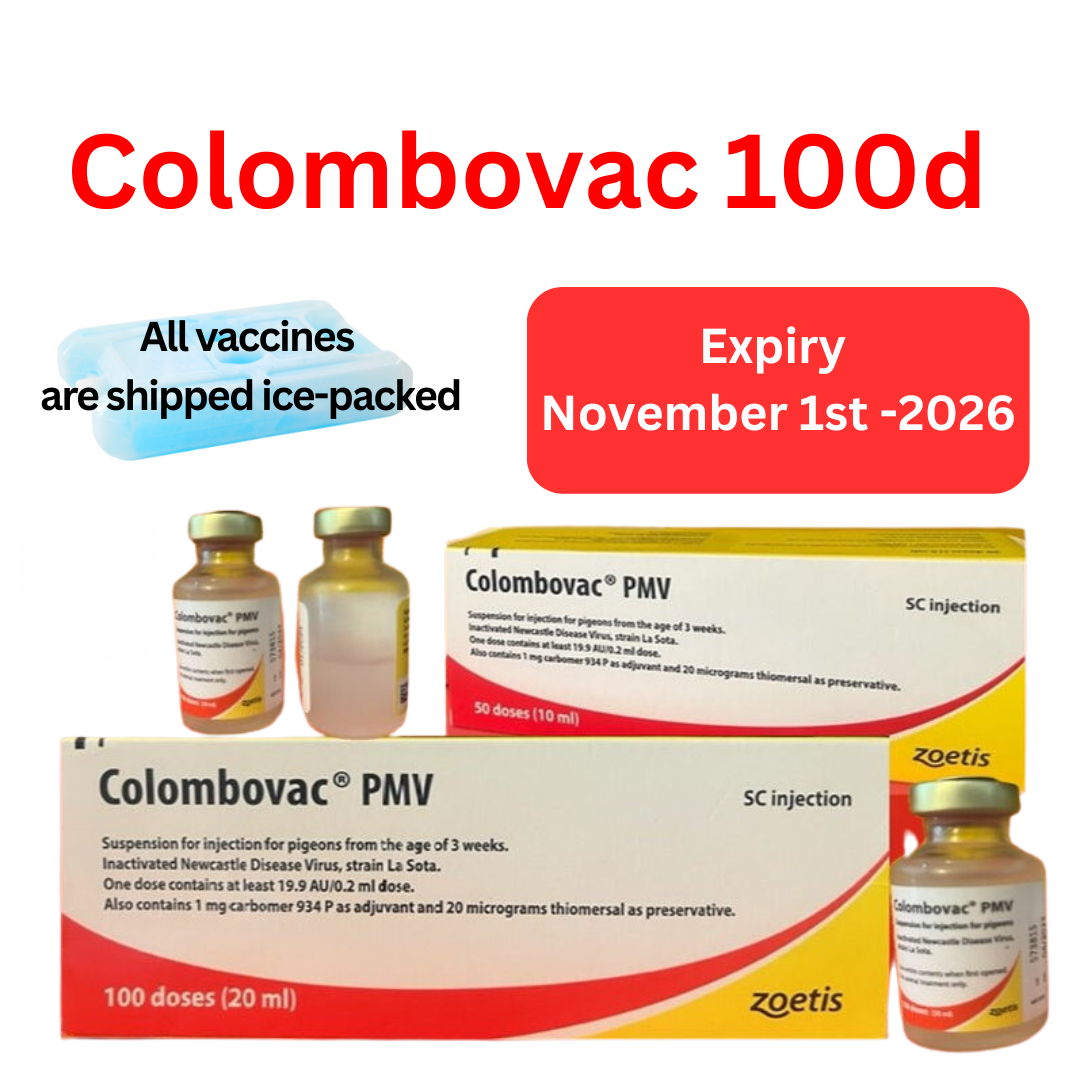My Store
COLOMBOVAC PMV PARAMYXO VIRUS VACCINE 100 DOSE EXPIRY 01-11 -2026
COLOMBOVAC PMV PARAMYXO VIRUS VACCINE 100 DOSE EXPIRY 01-11 -2026
Couldn't load pickup availability
COLOMBOVAC PARAMYXO VACCINE 100 DOSE
EXPIRY 01-11 -2026
Colombovac PMV Pigeon Vaccine – 50 Dose
A water-based injectable vaccine for racing and show pigeons against Paramyxovirus (Newcastle Disease).
Key Points
-
Mandatory vaccination for racing pigeons before racing.
-
Water-based vaccine → safer than oil-based alternatives.
-
Also available in 100-dose pack.
-
One dose = 0.2 ml per pigeon.
-
Supplied with a vaccine record card.
Contents
-
Active substance: Inactivated Newcastle Disease Virus (strain La Sota).
-
Adjuvant: 1 mg Carbomer 934 P.
-
Preservative: 20 µg Thiomersal.
-
Each 0.2 ml dose induces a GMT-HI titre of at least 27.0 in chicks.
Uses
-
For the active immunisation of pigeons to prevent mortality and clinical signs of Paramyxovirus type 1 infection.
-
Onset of protection: 1 month after vaccination.
-
Duration of protection: 12 months.
Dosage & Administration
-
One dose (0.2 ml) per pigeon.
-
Administer subcutaneously in the back of the neck (towards the back).
-
Swirl vial gently before use.
Vaccination Schedule
Primary Vaccination
-
Racing pigeons: Annually, ≥14 days before racing season. Young birds: from 3 weeks of age.
-
Show pigeons: Annually, ≥14 days before show season. Young birds: from 3 weeks of age.
-
After vaccination → avoid contact with outside pigeons for 14 days.
Booster Vaccination
-
All adult pigeons require a booster annually.
-
May be given earlier if it would otherwise interfere with training/racing/show schedules.
Contraindications & Warnings
-
For animal treatment only.
-
Do not use in unhealthy pigeons.
-
Do not vaccinate:
-
within 2 weeks before mating,
-
during lay,
-
within 4 weeks before the onset of lay.
-
-
Safe for breeding birds if given before breeding season.
-
Do not mix with other vaccines or give within 14 days of another vaccine.
-
Not for intramuscular injection – causes severe reactions.
-
High maternal antibodies may reduce effectiveness → time vaccination accordingly.
Adverse Reactions
-
Rare (<1%): small, temporary swelling at injection site.
-
Overdose may increase swelling.
-
Hypersensitivity → treat immediately with glucocorticoid IV or adrenaline IM.
Disease Transmission Notes
-
Pigeon paramyxovirus incubation: a few days to weeks.
-
Infected pigeons can shed virus 3–4 days after infection, often before showing symptoms.
-
Virus can be shed up to 6 weeks → strict biosecurity needed.
-
Owners should restrict loft visitors and only introduce vaccinated new birds (≥14 days post-vaccination).
Pharmaceutical Precautions
-
Store refrigerated: +2°C to +8°C.
-
Do not freeze. Protect from light.
-
Use entire vial after opening.
-
Keep out of reach of children.
-
Observe expiry date on label.
Withdrawal Period
-
Zero days.
Legal Category
-
POM-VPS (Prescription Only Medicine – Veterinarian, Pharmacist, Suitably Qualified Person).
⚠️ Accidental self-injection: Seek medical attention immediately and show the product leaflet/label to a doctor.
Share


